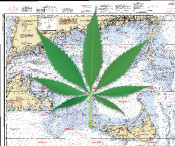MA Islands Face “Miracle Ounce” Paradox
Like the so-called “miracle ounce,” whereby possession of an ounce of marijuana is legal even though it is illegal to buy, sell or grow it, patients on Massachusetts’ islands are free to possess and smoke medically-prescribed, regulated, and taxed, medical marijuana. They may not, however, bring it to the island or grow it on the island, and cannot legally buy it on the island. Short of finding fields of wild marijuana that happen to fit all federal regulations, it seems impossible to exercise one’s legal right to use medical marijuana treatments if one happens to live on Nantucket or Martha’s Vineyard.
This does not sit well with island residents, many of whom are seniors and retirees who have cancer or other chronic conditions.
Residents point out that, yes, they could now legally obtain medical marijuana in a state-registered dispensary, but none have been approved on any of the islands. They may not obtain it legally in a mainland dispensary on the mainland and take it with them, because getting to the islands means passing through Federally-controlled waters, and the U. S Coast Guard maintains that it is illegal to transport and possess marijuana.
Both Nantucket and Martha’s Vineyard are their own counties, and theoretically subject to the same legal framework around medical marijuana as the rest of Massachusetts. According to regulations, every country must have a medical marijuana dispensary. But regulations also forbid pot from being transported across U.S. waters. This added complexity of federal restrictions is frustrating to those who are waiting for relief from pain and symptoms.
However, there is one way around the impasse. According to state law, a medical marijuana dispensary could be licensed to grow and sell pot at the same location. Last year, Patient Centric of Martha’s Vineyard, a company owned by Geoff Rose, applied for a license but did not successfully complete the process. Rose, a 14-year Martha’s Vineyard resident by way of New York, has addressed those issues and has renewed his bid.
He sees the federal complexities as just a bump in the road. He is optimistic that his dispensary will be open next year in the Martha’s Vineyard town of West Tisbury.
As baby boomers age, a so-called “silver tsunami” is coming, and the islands of Martha’s Vineyard and Nantucket are prime retirement locations. The percentage of residents age 65 or older is already higher on the two islands than the mainland, around 16-17% as compared with 13-14% for the mainland, and these figures will only grow in coming years. Also, the islands have a large labor force of tradesmen who often suffer from chronic pain due to accidents or the physical demands of their jobs.
The federal waters obstacle is only one of the many complexities of implementing the medical marijuana program. There are still many gray areas where state and federal laws clash. Advocates for medical marijuana are working to clarify these laws so that patients can get relief.
“No matter how many states do it, we are still going to have some of these weird loopholes that people fall into,” said Christopher Brown, spokesman for the Washington, D.C.-based Americans for Safe Access.
This is only the most recent problem with implementing Massachusetts’ medical marijuana program. Although the program was passed in 2012, allows as many as 35 dispensaries, and requires one in each county, to date only one has opened. Recently, however, Republican Gov. Charlie Baker has ordered a more streamlined licensing process, which began in June. Medical marijuana supporters have praised the move. Eric Sheehan, interim director of the Bureau of Health Care Quality at DPH, has said that the counties without dispensaries will be at the front of the line, “to better fill underserved areas of the state.”
This change, however, will take time. According to the DPH website, it will take licensees 210 to 540 days to complete their pre-opening protocol, and DPH protocol will take 38 to 79 days, although some days may overlap.
Rose, president of Patient Centric of Martha’s Vineyard, noted, “It’s definitely a lot more organized and streamlined this time.”
Mr. Rose had always planned to grow on-island. He noted that it is simpler, and will create jobs.
Even if the licensing goes through, there is one more Catch-22 left. It is currently illegal to transport fertilized seeds and seedlings across state lines or federally controlled waters. Other states have faced this problem. “Everyone agreed to look the other way,” said a state representative from Chicago, addressing this paradox. His solution? “We purposely left the bill silent. There is no way to write this.”
Perhaps the only way to find a creative, out-of-the-box solution to the problem is to try creative, out-of-the-box approaches. Until or unless the federal government re-visits their classification of marijuana as a Schedule 1 drug, these problems are likely to persist. As it is, those with chronic, painful conditions are being asked to wait longer, again.
Source: http://www.wcvb.com/health/cannabis-conundrum-in-massachusetts/34196160
